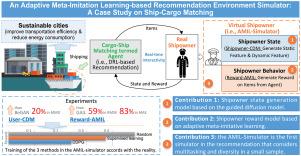基于元模仿学习的自适应推荐环境模拟器:船货匹配案例研究
IF 14.7
1区 计算机科学
Q1 COMPUTER SCIENCE, ARTIFICIAL INTELLIGENCE
引用次数: 0
摘要
高质量的航运是内河流域可持续发展城市提高运输效率、降低能源消耗的有效途径之一。目前,航运业面临的最大挑战是空船率高,由于冷启动问题,无法直接应用机器学习方法。虽然一些研究人员已经尝试利用基于深度强化学习(DRL)的推荐方法来缓解冷启动问题,但由于缺乏可用的训练环境,进展十分缓慢。因此,本文介绍了一种基于元模仿学习的自适应推荐环境模拟器,称为 AMIL-Simulator。具体来说,我们构建了一个条件引导扩散模型,以模拟动态变化环境中的船东行为。此外,我们还提出了基于自适应元模仿学习的船东奖励模型,即使面对有限的样本和不平衡的类别,也能在多个任务中学习船东奖励。通过广泛的定量实验评估和船东-货物匹配研究,结果证明了 AMIL 模拟器的有效性,尤其是在较小规模和冷启动环境中。本文章由计算机程序翻译,如有差异,请以英文原文为准。

An adaptive meta-imitation learning-based recommendation environment simulator: A case study on ship-cargo matching
High-quality shipping is one of the effective ways for sustainable cities in inland river basins to improve transportation efficiency and reduce energy consumption. Currently, the biggest challenge faced by shipping is the high empty-ship rate, which makes it impossible to directly apply machine learning methods due to the cold-start problem. Although some researchers have tried to utilize deep reinforcement learning(DRL)-based recommendation that do not rely on manually labeled data to alleviate the cold-start problem, progress has been slow due to the lack of available training environment. Therefore, this paper introduces an adaptive meta-imitation learning-based recommendation environment simulator, termed AMIL-Simulator. Specifically, we construct a conditionally guided diffusion model to simulate shipowner behavior in a dynamically changing environment. Moreover, we propose a shipowner reward model based on adaptive meta-imitation learning, enabling the learning of shipowner rewards across multiple tasks, even when confronted with limited samples and imbalanced categories. By conducting extensive quantitative experimental evaluations and shipowner-cargo matching studies, the results demonstrate the effectiveness of AMIL-Simulator, particularly in smaller-scale and cold-start environments.
求助全文
通过发布文献求助,成功后即可免费获取论文全文。
去求助
来源期刊

Information Fusion
工程技术-计算机:理论方法
CiteScore
33.20
自引率
4.30%
发文量
161
审稿时长
7.9 months
期刊介绍:
Information Fusion serves as a central platform for showcasing advancements in multi-sensor, multi-source, multi-process information fusion, fostering collaboration among diverse disciplines driving its progress. It is the leading outlet for sharing research and development in this field, focusing on architectures, algorithms, and applications. Papers dealing with fundamental theoretical analyses as well as those demonstrating their application to real-world problems will be welcome.
 求助内容:
求助内容: 应助结果提醒方式:
应助结果提醒方式:


